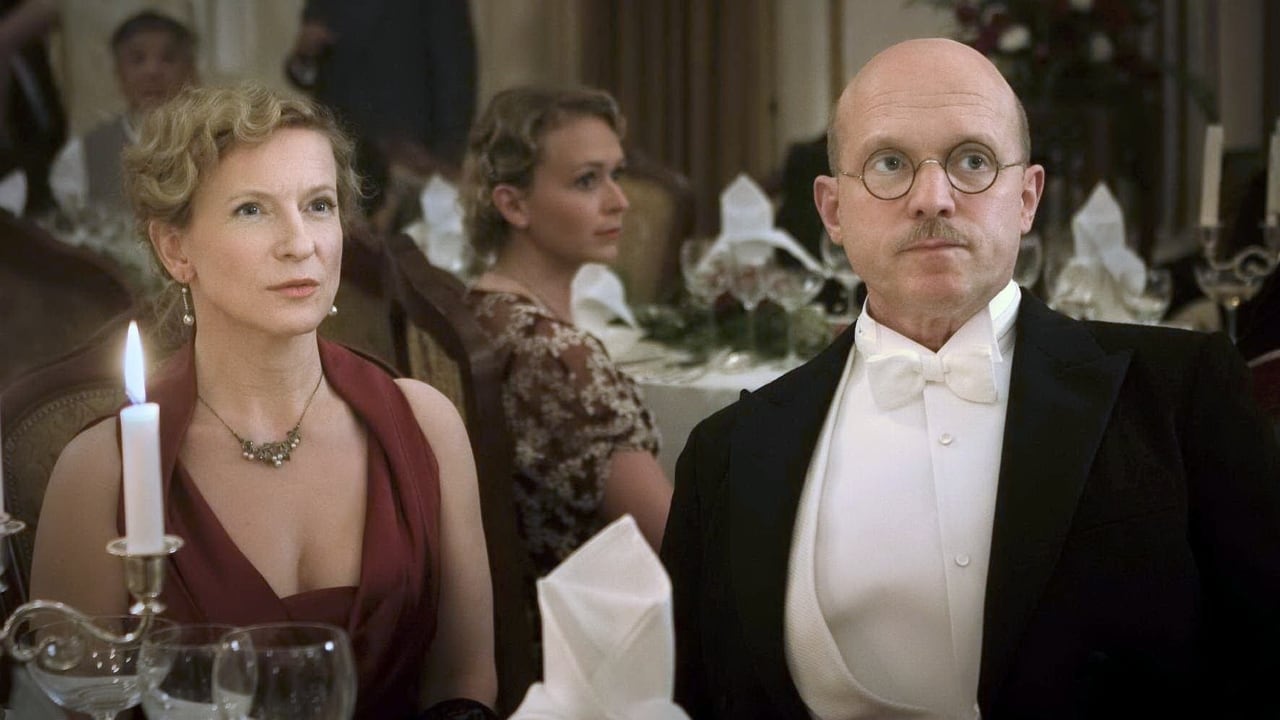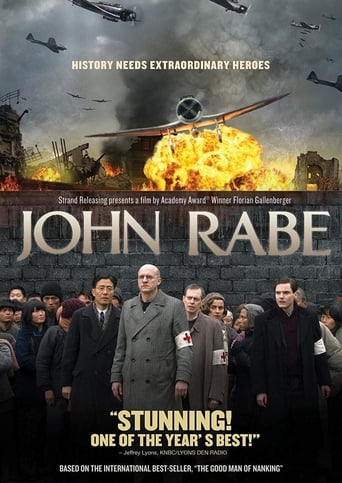

I saw the movie on a Chinese video forum. Unfortunately I missed around 70 percent of the dialog because it was in German with Chinese subtitles. The only parts I understood are the scenes that involved the other foreigners in the safety zone. I missed a great deal of what otherwise could have been a great film. The other languages spoken were Japanese and Chinese. I guess the film makers were trying to stay true to the actual event. While I could understand Chinese I could not read the Chinese subtitles when it came to characters speaking German or Japanese. I could only go by the actors acting to follow the story line. But not having the entire dialog made the story disjointed. However, this IS a story that needs to be told.
... View MoreThe film John Rabe is movie about two things, both interesting, both unknown, and both controversial: the "good" Nazi, and the Rape of Nanking. There have only been a few films about "good" Nazis that I know of, although I'm sure there are others I'm missing, this film, Seven Years in Tibet, and the 49th Parallel. This alone makes this film interesting.But John Rabe (the film) is also about the Rape of Nanking, the atrocities committed by the Japanese military to the Chinese people in the city of Nanking. This also would be enough to make this movie interesting.So we have a movie with two interesting topics, but ultimately fails as a compelling work. Why? The director pulled far too many punches in regards to the violence of Nanking. Maybe I'm a little hardened by watching films, but there was nothing about this movie that jumped out at me and drove home the lawlessness and violence of the Japanese occupation of Nanking. There is no way to show this and be discreet. The middle of the film was crying for a lurid montage of gang rapes, flies on corpses, and the worst depravities you can think of. John Rabe's own diaries describe many of these, you wouldn't have even had to think up any of your own and you could have had his character narrated the whole thing.The film fails in depicting the Rape of Nanking, but it also fails in depicting the good Nazi too. The movie needed a moment, several years later, with John Rabe confronting the Nazi atrocities in WWII and comparing them with the Japanese atrocities in Nanking. We need to see him understand what his own people have done and what his membership in the Nazi party truly means as a stain on his character. We needed to see him understand that and tear up his membership card or something. We, however, do not and the movie is much the poorer because of it.Despite this, the movie is still beautifully shot, with good production value, limited but effective CGI, and wonderfully acted. The movie is ultimately frustratingly incomplete and is not the best that could have been done with the material, but it was enjoyable while it lasted.
... View More... essentially all has been said, but some reviews criticize the diversions from the original story. These would seem to have something to do with Chinese censorship following concerns about economic cooperation with Japan. That may explain the sometimes disjointed story structure, and the inclusion of a 'good' Japanese officer warning the Germans about imminent danger to the safety zone, while there is still ample display of Japanese brutality - even though, if you ever visited the memorial in Nanjing itself, you'll find these rather tame in comparison to the photos there.At the time of its release in Germany, reviews were largely negative because Rabe's Nazi Party membership was downplayed in the film. His naivety in regard to Hitler is portrayed (writing him letters urging Hitler to intervene on behalf of the safety zone), but this was seen as way too ambivalent. Gallenberger was criticized for making a 'big' film with Hollywood clichés. And instead of a competition slot at the Berlinale, the film was screened as a 'Special' because the festival apparently shied away from controversy. Having only seen it now for these reasons, I must say that these complaints are exaggerated. There's nothing wrong with a German director trying to make a real cinematic feature instead of an overblown TV production, as it is usually the case. And Gallenberger was certainly the right man for the job, given his previous endeavor of a German Bollywood film. Sadly, the entirely justified vilification of the Nazi regime still clouds the perception of individuals living in that era, and there's some sort of German instinct to snap at everything that could be even remotely interpreted as euphemism - which isn't the case here.What I really liked about the film was that it clarifies that the safety zone was an international 'joint venture' so to speak, instead of being due to the efforts of Rabe alone. Buscemi played all the right keys with his character, and still restrained his presence to allow Ulrich Tukur to take central stage. And his performance is definitely worth the BlueRay. He is one of the very few German actors with aura; Daniel Brühl, in my opinion, isn't, but he's pretty good here, as his scenes with Tukur are balanced very well.If you found John Rabe's story amazing, you might be interested in the even more controversial Johannes Lepsius, who was the principal witness of the Armenian Genocide during World War I - under similar circumstances, as Germany and Turkey were allies, as with the Japanese at the time of the Nanjing Massacre. I couldn't help but think of that while watching 'John Rabe' - that a film based on Lepsius would be far more controversial than this one, since Turkey denies the Armenian genocide to this day even more vehemently than Japan denies Nanjing.I give 'John Rabe' 8/10 because I feel this film has been treated a little harshly, but 7.5 sounds just about right.
... View MoreAn important movie that must be watched. John Rabe was a hero to the Chinese people. He saved 200,000 men, women, and children from certain hardship, probable torture, and likely death. Yet after the war, he was condemned by his country, and lived a life of poverty, slipping into obscurity until his death. There has been too little written about this man. "The Rape of Nanjing" by Iris Chang does cover him in good detail in parts of the book. It's certainly about time for a piece to have been done about his efforts in Nanjing, about his life. The movie is masterfully paced, poignant, and at times devastatingly sad - only able to hint at the atrocities the people of Nanjing must have faced. Yet the movie is ultimately a tribute to the power of few to change the lives of many, to the ultimate goodness of humans.
... View More